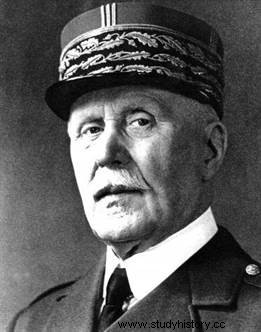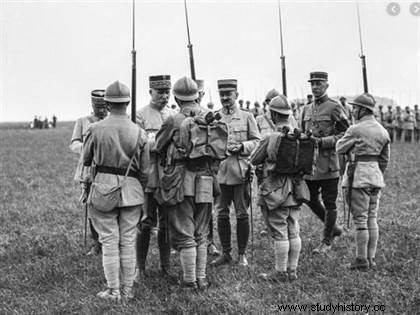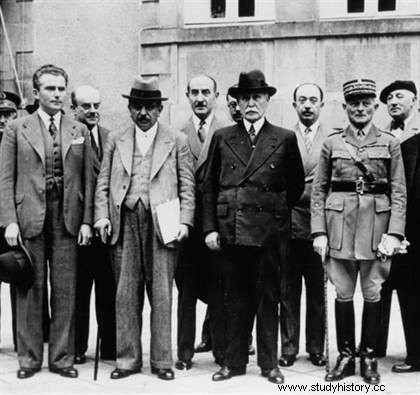 Passed down to posterity as the conqueror of Verdun during the First World War, MarshalPétain became, after the defeat of 1940, the head of the “French State” of Vichy. After accepting an armistice with very harsh conditions for France, he tried to promote his “National Revolution”, while letting his government pursue a policy of collaboration with Nazi Germany. His fate, which is associated with the hours of glory as well as the darkest episodes in the history of the 20th century, explains why, nearly fifty years after his disappearance, his action continues to be the subject of lively controversy.
Passed down to posterity as the conqueror of Verdun during the First World War, MarshalPétain became, after the defeat of 1940, the head of the “French State” of Vichy. After accepting an armistice with very harsh conditions for France, he tried to promote his “National Revolution”, while letting his government pursue a policy of collaboration with Nazi Germany. His fate, which is associated with the hours of glory as well as the darkest episodes in the history of the 20th century, explains why, nearly fifty years after his disappearance, his action continues to be the subject of lively controversy.
Philippe Pétain, the winner of Verdun
Henri Philippe Benoni Omer Joseph Pétain was born on April 24, 1856 in Pas de Calais. Coming from a rural and Catholic background, he chose the profession of arms early on. Saint-Cyrien, rather discreet about his political opinions (at a time when the army was plunged into the turmoil of the Dreyfus affair), he nevertheless distinguished himself by his tactical ideas that went against the tide of official doctrine. Against the drive and the force of bayonets, Pétain opposes the power of artillery and equipment:“Fire kills”.
 The war of 1914 finds him a colonel and he who was thinking of retirement is propelled to the head of a infantry brigade. It was the start of a dazzling career, which saw him command an army (the 2nd) from June 1915. Pétain, charismatic and tenacious, perfectly understood the challenges of modern industrial warfare. His attention to questions of logistics and troop morale will be instrumental in the failure of the German offensive on Verdun (1916). The order of the day for April 10, 1916 ends with a three-word sentence that will go down in history:“We will have them! .
The war of 1914 finds him a colonel and he who was thinking of retirement is propelled to the head of a infantry brigade. It was the start of a dazzling career, which saw him command an army (the 2nd) from June 1915. Pétain, charismatic and tenacious, perfectly understood the challenges of modern industrial warfare. His attention to questions of logistics and troop morale will be instrumental in the failure of the German offensive on Verdun (1916). The order of the day for April 10, 1916 ends with a three-word sentence that will go down in history:“We will have them! .
The defender of Verdun has become, forever and for all of France, the "winner of Verdun". Its prestige is universally recognized. On May 15, 1917, the Ribot government called him to succeed Nivelle, commander-in-chief. He immediately came up against several mutinies, consequences of the failure of the Chemin des Dames and defeatist propaganda. He overcomes them with a minimum of penalties, improving the material situation of the fighter and developing operations that are not very dangerous, but pay off psychologically. The ensuing lull allowed him to completely reorganize the army. It was this army that Foch would lead to victory in 1918.
Marshal Pétain’s political career
Became Marshal of France at the end of 1918, he partly presided over the evolution of the French army following the victory. A supporter of firepower, he promotes infantry support tanks. His political career really began when he was appointed Minister of War in 1934. Due to the ministerial instability of the time, his mandate was short-lived, but earned him a solid reputation as a statesman.
In the eyes of the extreme right in particular, Pétain appears as a leader very ready to do battle with Germany. Promoter of the mechanization of the army against the official defensive doctrine, he is then in agreement with his former collaborator:Charles de Gaulle. Appointed ambassador to Spain in March 1939, Pétain built up a solid political network. Anticipating a possible French defeat against Hitler, he appealed to the staff of the Third Republic, whom he considered responsible for the country's weakness.
Called to the government in the midst of turmoil on May 17, 1940, Pétain became President of the Council a month later. Convinced that continuing the fight is impossible, in favor of a profound overhaul of French society and politics, he announced in his appeal of June 17, 1940 that armistice negotiations with the Germans had begun. This call leads to the collapse of the resistance of many French units, allowing the Germans to take hundreds of thousands of prisoners.
On July 10, 1940, in Vichy, the new seat of government, the National Assembly, by 569 votes to 80, gave Marshal Pétain "all powers... effect of promulgating a new Constitution of the French State... This Constitution must guarantee the rights of Labour, of the Family and of the Fatherland”. The next day, the Constitutional Acts recognized the Marshal as "Head of State", vested with legislative power until the formation of new assemblies. Writers who later changed their attitude (Claudel, Mauriac, many others) celebrated his merits lyrically.
The National Revolution
During the summer of 1940, Pétain and his entourage (primarily Pierre Laval) set up the French state. While France was two-thirds occupied by the Germans, the marshal's government set the country on the path of collaboration while pursuing a reactionary policy, which could be compared to that of Franco or Salazar. Invested with full powers by Parliament (in irregular conditions) since July 10, Marshal Pétain put forward ideas of order and a return to Christian morality.
 Marshal Pétain, especially preoccupied by his will to put into practice the program of the National Revolution and by that of obtaining the release of the prisoners of war, is persuaded to meet Hitler, in Montoire, on October 24, 1940. This “National Revolution” will be accompanied by vigorous repression against any political opposition. Committed to anti-Semitic ideas, Pétain gradually excluded the Jews from national life before subsequently handing them over to the occupier. Officially neutral, the French State nevertheless leans towards the German side, using the Anglophobia aroused by the affairs of Mers-El-Kébir and Dakar.
Marshal Pétain, especially preoccupied by his will to put into practice the program of the National Revolution and by that of obtaining the release of the prisoners of war, is persuaded to meet Hitler, in Montoire, on October 24, 1940. This “National Revolution” will be accompanied by vigorous repression against any political opposition. Committed to anti-Semitic ideas, Pétain gradually excluded the Jews from national life before subsequently handing them over to the occupier. Officially neutral, the French State nevertheless leans towards the German side, using the Anglophobia aroused by the affairs of Mers-El-Kébir and Dakar.
Deeply conservative, imbued with the backward-looking image of a peasant and patriarchal France, Pétain gathered around him, in the government of Vichy, men from various backgrounds (from classic parliamentarians, like Laval, to pacifist trade unionists, like René Belin, passing through technocrats, such as Yves Bouthillier or Paul Baudouin), taking advantage of the very broad powers conferred on him to implement the National Revolution.
His immense prestige, his great age, the skilful handling of a guilt-inducing rhetoric (explaining the defeat by the past victory of "the spirit of enjoyment over the spirit of sacrifice ") are put, thanks to a consummate art of propaganda, at the service of a cult of personality which, in spite of some disputes then marginal, like that of General de Gaulle, ensure to the winner of Verdun a great popularity during the beginnings of the diet.
The twilight of Marshal Pétain
 When the allies landed in North Africa in November 1942, Vichy troops opposed it, on the Marshal's order. Hitler, who has no confidence in the loyalty of the French state, decides to invade the free zone, depriving Pétain of his last asset against Berlin:the armistice army. From the end of 1942 to June 1944, the influence of the marshal receded against that of Pierre Laval who obtained the support of the Germans. The French state then experienced a real "fascization", Pétain, who had been very popular until then, gradually lost the confidence of many French people.
When the allies landed in North Africa in November 1942, Vichy troops opposed it, on the Marshal's order. Hitler, who has no confidence in the loyalty of the French state, decides to invade the free zone, depriving Pétain of his last asset against Berlin:the armistice army. From the end of 1942 to June 1944, the influence of the marshal receded against that of Pierre Laval who obtained the support of the Germans. The French state then experienced a real "fascization", Pétain, who had been very popular until then, gradually lost the confidence of many French people.
The Liberation will lead to the rapid and violent liquidation of the French state as Pétain is taken against his will to Germany by the Nazis. Installed in Sigmaringen he will experience the collapse of the Reich as an isolated and bitter spectator.
Hearing that his trial is preparing, he implores Hitler to let him return to France. On April 24, 1945, he presented himself freely at the Swiss border. The next day, the new French authorities arrest him. Brought before the High Court on July 23, he read a short statement following which he observed complete silence, leaving the charge of his defense to Mes Payen, Lemaire and Isorni.
His trial, which will last only three weeks, will see him assert himself in his defense as a supporter of the resistance. This strategy will not pay off. By 14 votes to 13, he was sentenced to the death penalty, national indignity and the confiscation of his property. Due to his age, the court asks that his death sentence not be carried out. Wish granted by the president of the provisional government, General de Gaulle.
Locked up on the island of Yeu, the former head of the French state sees his health and his mental faculties decline. He died in Port-Joinville on July 23, 1951.
Bibliography
- Pétain by Marc Ferro, biography. Fayard, 1987.
- The World War 1914-1918, by Philippe Pétain. Private, 2014.
- Vichy France, 1940-1944, by Robert O. Paxton. History Points, 1999.
